
Icons of Evolution is a book by Jonathan Wells, an advocate of the pseudoscientific intelligent design argument for the existence of God and fellow of the Discovery Institute, in which Wells criticizes the paradigm of evolution by attacking how it is taught. The book includes a 2002 video companion. In 2000, Wells summarized the book's contents in an article in the American Spectator. Several of the scientists whose work is sourced in the book have written rebuttals to Wells, stating that they were quoted out of context, that their work has been misrepresented, or that it does not imply Wells's conclusions.

John David Barrow was an English cosmologist, theoretical physicist, and mathematician. He served as Gresham Professor of Geometry at Gresham College from 2008 to 2011. Barrow was also a writer of popular science and an amateur playwright.
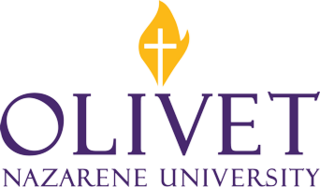
Olivet Nazarene University (ONU) is a private Nazarene university in Bourbonnais, Illinois. Named for its founding location, Olivet, Illinois, ONU was originally established as a grammar school in east-central Illinois in 1907. In the late 1930s, it moved to the campus in Bourbonnais. The university is affiliated with the Church of the Nazarene and is the annual site of the church's Regional Celebrate Life youth gathering for the Central USA Region.
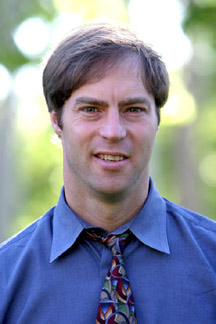
Stephen Charles Meyer is an American historian, author, and former educator. He is an advocate of intelligent design, a pseudoscientific creationist argument for the existence of God. Meyer was a founder of the Center for Science and Culture (CSC) of the Discovery Institute (DI), which is the main organization behind the intelligent design movement. Before joining the institute, Meyer was a professor at Whitworth College. He is a senior fellow of the DI and the director of the CSC.
Access Research Network (ARN) is an American non-profit organization that reports on science, technology and society from an intelligent design perspective. ARN primarily disseminates information via its website, located at ARN.org, which contains commentary, articles, videos, links, and a bookstore, all focusing on intelligent design. Between 2006 and 2011, ARN also published an annual list of "Top 10 Darwin and Design News Stories" compiled by ARN staff and released at the end of each year.

The Catholic Church holds no official position on the theory of creation or evolution, leaving the specifics of either theistic evolution or literal creationism to the individual within certain parameters established by the Church. According to the Catechism of the Catholic Church, any believer may accept either literal or special creation within the period of an actual six-day, twenty-four-hour period, or they may accept the belief that the earth evolved over time under the guidance of God. Catholicism holds that God initiated and continued the process of his creation, that Adam and Eve were real people, and that all humans, whether specially created or evolved, have and have always had specially created souls for each individual.
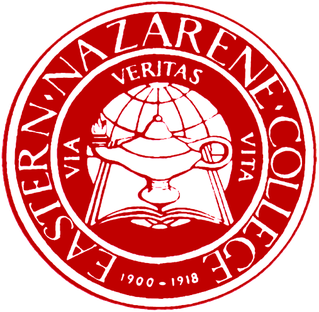
The Eastern Nazarene College (ENC) is a private, Christian college in Quincy, Massachusetts. Established as a holiness college in Quincy, Massachusetts, in 1900, the college moved to Rhode Island for several years. With its expansion to a four-year curriculum, it relocated to Wollaston Park in 1919. It has expanded to additional sites in Quincy and, since the late 20th century, to satellite sites across the state. Its academic programs are primarily undergraduate, with some professional graduate education offered.

Quincy College (QC) is a public community college in Quincy, Massachusetts. It is an open admission commuter school that offers associate degrees, bachelor degrees, and certificate programs. It was founded in 1958 and enrolls approximately 3,500 students at campuses in Quincy and Plymouth, Massachusetts.

Ronald Leslie Numbers was an American historian of science. He was awarded the 2008 George Sarton Medal by the History of Science Society for "a lifetime of exceptional scholarly achievement by a distinguished scholar".
The Nazarene International Education Association (NIEA) is now called Nazarene Educators Worldwide(NEW) and is a part of the Church of the Nazarene. The Church of the Nazarene owns and operates 11 liberal arts institutions in Africa, Canada, Korea, and the United States, as well as 3 graduate seminaries, 37 undergraduate Bible/theological colleges, 3 nurses training colleges, 1 junior college, and 1 education college worldwide. At least in terms of the American institutions, the Church of the Nazarene seems to have changed its original official philosophy of abandoning academies, bible colleges, and universities to focus on liberal arts colleges, as 7 of the 8 "liberal arts colleges" call themselves universities, and there is now a bible college in Colorado Springs. The early-twentieth-century philosophy, as expressed by J.B. Chapman:
It was originally the plan to call every school we started a “university” ... It was our ultimate aim to have universities and our schools were named according to our vision of future developments. But I am, personally, convinced that we should definitely abandon the idea of building any universities, that we should drop these names from our schools... [Moreover,] it is my conclusion that we ... cannot permanently maintain academies and they do not meet our need, that a special Bible school does not meet our needs and that we should express ourselves on this conviction.... That the College, with the necessary fitting school and Bible department[,] is the school that we need and will build."
Richard G. Colling is a former professor of biology and chairman of the biological sciences department at Olivet Nazarene University in Bourbonnais, Illinois, who was barred from teaching general biology after writing a book that attempts to reconcile Christian belief with a scientific understanding of evolution.
Karl Willard Giberson is a Canadian physicist, scholar, and author, specializing in the creation–evolution debate. He has held a teaching post since 1984, written several books, and been a member of various academic and scientific organizations. He formerly served as vice president of the BioLogos Foundation.
Nicholas J. Matzke is the former Public Information Project Director at the National Center for Science Education (NCSE) and served an instrumental role in NCSE's preparation for the 2005 Kitzmiller v. Dover Area School District trial. One of his chief contributions was discovering drafts of Of Pandas and People which demonstrated that the term "intelligent design" was later substituted for "creationism". This became a key component of Barbara Forrest's testimony. After the trial he co-authored a commentary in Nature Immunology, was interviewed on Talk of the Nation, and was profiled in Seed as one of nine "revolutionary minds".
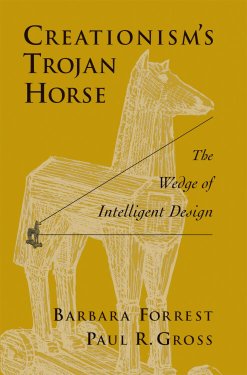
Creationism's Trojan Horse: The Wedge of Intelligent Design is a 2004 book by Barbara Forrest and Paul R. Gross on the origins of intelligent design, specifically the Discovery Institute's Center for the Renewal of Science and Culture and its wedge strategy. The authors are highly critical of what they refer to as intelligent design creationism, and document the intelligent design movement's fundamentalist Christian origins and funding.

Pauline Alice Maier was a revisionist historian of the American Revolution, whose work also addressed the late colonial period and the history of the United States after the end of the Revolutionary War. She was the William R. Kenan, Jr. Professor of American History at the Massachusetts Institute of Technology (MIT).

Explore Evolution: The Arguments For and Against Neo-Darwinism is a controversial biology textbook written by a group of intelligent design supporters and published in 2007. Its promoters describe it as aimed at helping educators and students to discuss "the controversial aspects of evolutionary theory that are discussed openly in scientific books and journals but which are not widely reported in textbooks." As one of the Discovery Institute intelligent design campaigns to "teach the controversy" its evident purpose is to provide a "lawsuit-proof" way of attacking evolution and promoting pseudoscientific creationism without being explicit.
Leonard Brand is an American biologist, paleontologist, and Seventh-day Adventist creationist. He is a professor and past chair of Loma Linda University Department of Earth and Biological Sciences. Brand's most widely debated research was regarding fossil tracks at the Grand Canyon.
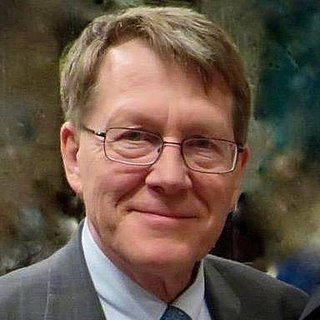
Kent Richmond Hill is Senior Fellow for Eurasia, Middle East, and Islam at the Religious Freedom Institute in Washington, D.C..
James Reese Cameron is an educator and historian.
Although biological evolution has been vocally opposed by some religious groups, many other groups accept the scientific position, sometimes with additions to allow for theological considerations. The positions of such groups are described by terms including "theistic evolution", "theistic evolutionism" or "evolutionary creation". Of all the religious groups included on the chart, Buddhists are the most accepting of evolution. Theistic evolutionists believe that there is a God, that God is the creator of the material universe and all life within, and that biological evolution is a natural process within that creation. Evolution, according to this view, is simply a tool that God employed to develop human life. According to the American Scientific Affiliation, a Christian organization of scientists:
A theory of theistic evolution (TE) — also called evolutionary creation — proposes that God's method of creation was to cleverly design a universe in which everything would naturally evolve. Usually the "evolution" in "theistic evolution" means Total Evolution — astronomical evolution and geological evolution plus chemical evolution and biological evolution — but it can refer only to biological evolution.










